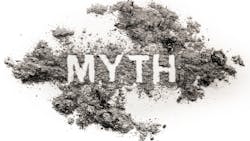Myth busters for dental assistants: Can’t we just go back to work already?
I’m so tired of being off work due to COVID-19. Can’t we just go back to work and stop this madness?
No! We can’t go back to work for a couple of reasons.
We have some pretty strict infection control practices in dentistry, but do we follow them like we are supposed to? Many times, when I visit an office to perform an assessment, (part of my job is to help offices become compliant in infection control), I see many things that are not quite right. When I see this I always go back to: you don’t know what you don’t know! This means offices do not intentionally do anything wrong, they just haven’t been trained in proper infection control.
Sometimes when I visit offices, staff members tell me, “I just had OSHA (Occupational Safety and Health Administration) training, and we didn’t learn any of this.” I tell them, “No, because infection control isn’t OSHA.” Many confuse the two, but they’re very different. Like the name, OSHA is occupational safety, meaning it is there to protect workers—you! Infection control has a broader range because it protects both you and your patients—the public! When you use proper infection control and sterilization techniques to clean surfaces and instruments, you do not have to worry about spreading this virus. Note I say “properly.”
Also, COVID-19 spreads mainly through airborne particles, such as coughing and sneezing. It also spreads through aerosols such as those seen in dental offices when using a handpiece or ultrasonic cleaner.
What about our personal protective equipment (PPE)? Is it enough? Can we do anything differently? I believe our PPE is going to come under fire in the dental profession during the next few months. I believe what we wear will be significantly different in order to protect ourselves post-COVID-19.
What about those waterlines? Even if your office is seeing only emergency patients, offices aren’t using many of their operatories, therefore, leaving the water in the lines leads to stagnation. Right before you begin seeing patients again, you’ll need to shock your dental unit waterlines to ensure there is no biofilm buildup in the lines. If you aren’t shocking regularly, this should become part of the infection control protocol for your office and should be done quarterly, but especially now that ops have been unattended for a long time. If you don’t know the protocol, email me at [email protected] and I’ll be happy to help!
What we need to do right now is simply stay home! I realize this is a crazy time and most of us need our jobs. However, we need to heal as a nation and throughout the world. I beg you to listen to the warnings and not go into work. I hope your practices are seeing only emergency patients and that none of you are going in your offices due to fear of losing your jobs.
We’re still learning about this virus! There is no vaccine (as of this writing), and we’re just beginning to experiment with vaccines and drug treatment. But, what about the next round? Many predictions believe there will be another outbreak this fall. While we still don’t know all of the changes that are coming post-COVID-19, our dental practices can keep a watchful eye out to make sure we stay on top of things!
Want to learn more about infection control in the dental office? Now is the perfect time to visit the website for the Organization for Safety Asepsis and Prevention at osap.org and educate yourself.
Tija Hunter, CDA, EFDA, CDIA, CDSO, CDSH, MADAA, is a member and current vice president of the American Dental Assistants Association (ADAA), where she holds the honor of Master. Tija is the editor of Dental Assisting Digest and contributes to Dental Economics magazine. She is the director of the Dental Careers Institute, a dental assisting and dental continuing education program, and the author of seven continuing education study courses. She is an international speaker and a certified trainer in nitrous oxide in several states. Tija was named one of the Top 25 Women in Dentistry by Dental Products Report magazine in 2015. She can be reached at [email protected].
About the Author

Tija Hunter, CDA, EFDA
Tija Hunter, CDA, CDIA, CDIPC, CDSH, CDSO, EFDA, MADAA, is a member and former vice president of the American Dental Assistants Association (ADAA), where she holds the honor of Master. She is the director of the Dental Careers Institute, a dental assisting and dental continuing education program, and the author of seven continuing education study courses. She is an international speaker and a certified trainer in nitrous oxide in several states. She can be reached at [email protected].
